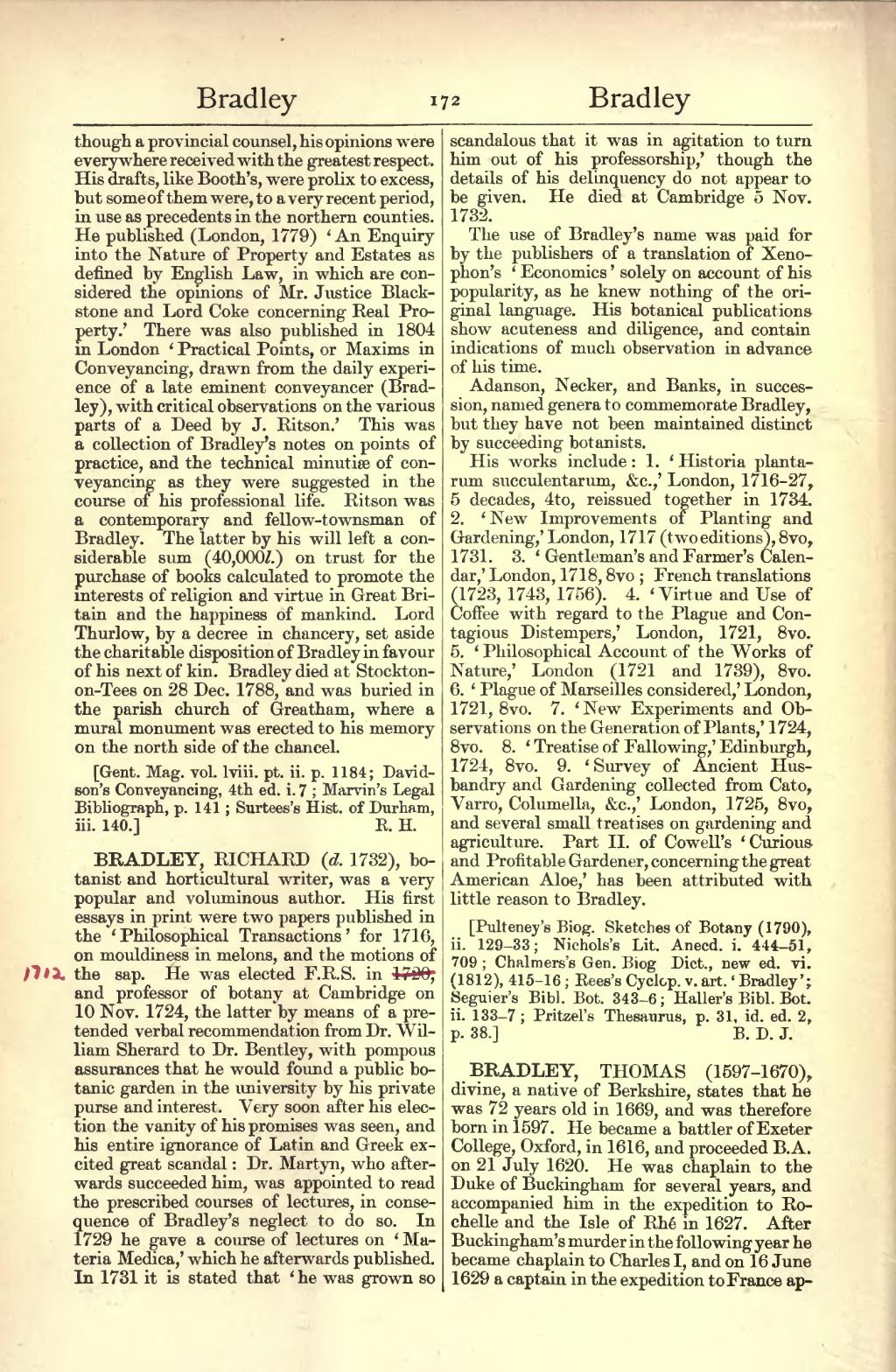though a provincial counsel, his opinions were everywhere received with the greatest respect. His drafts, like Booth's, were prolix to excess, but some of them were, to a very recent period, in use as precedents in the northern counties. He published (London, 1779) 'An Enquiry into the Nature of Property and Estates as defined by English Law, in which are considered the opinions of Mr. Justice Blackstone and Lord Coke concerning Real Property.' There was also published in 1804 in London 'Practical Points, or Maxims in Conveyancing, drawn from the daily experience of a late eminent conveyancer (Bradley), with critical observations on the various parts of a Deed by J. Ritson.' This was a collection of Bradley's notes on points of practice, and the technical minutiae of conveyancing as they were suggested in the course of his professional life. Ritson was a contemporary and fellow-townsman of Bradley. The latter by his will left a considerable sum (40,000l.) on trust for the purchase of books calculated to promote the interests of religion and virtue in Great Britain and the happiness of mankind. Lord Thurlow, by a decree in chancery, set aside the charitable disposition of Bradley in favour of his next of kin. Bradley died at Stockton-on-Tees on 28 Dec. 1788, and was buried in the parish church of Greatham, where a mural monument was erected to his memory on the north side of the chancel.
[Gent. Mag. vol. lviii. pt. ii. p. 1184; Davidson's Conveyancing, 4th ed. i. 7; Marvin's Legal Bibliograph, p. 141; Surtees's Hist. of Durham, iii. 140.]
BRADLEY, RICHARD (d. 1732), botanist and horticultural writer, was a very popular and voluminous author. His first essays in print were two papers published in the 'Philosophical Transactions' for 1716, on mouldiness in melons, and the motions of the sap. He was elected F.R.S. in 1720; and professor of botany at Cambridge on 10 Nov. 1724, the latter by means of a pretended verbal recommendation from Dr. William Sherard to Dr. Bentley, with pompous assurances that he would found a public botanic garden in the university by his private purse and interest. Very soon after his election the vanity of his promises was seen, and his entire ignorance of Latin and Greek excited great scandal : Dr. Martyn, who afterwards succeeded him, was appointed to read the prescribed courses of lectures, in consequence of Bradley's neglect to do so. In 1729 he gave a course of lectures on 'Materia Medica,' which he afterwards published. In 1731 it is stated that 'he was grown so scandalous that it was in agitation to turn him out of his professorship,' though the details of his delinquency do not appear to be given. He died at Cambridge 5 Nov. 1732.
The use of Bradley's name was paid for by the publishers of a translation of Xenophon's 'Economics' solely on account of his popularity, as he knew nothing of the original language. His botanical publications show acuteness and diligence, and contain indications of much observation in advance of his time.
Adanson, Necker, and Banks, in succession, named genera to commemorate Bradley, but they have not been maintained distinct by succeeding botanists.
His works include:
- 'Historia plantarum succulentarum, &c.,' London, 1716-27, 5 decades, 4to, reissued together in 1734.
- ' New Improvements of Planting and Gardening,' London, 1717 (two editions), 8vo, 1731.
- 'Gentleman's and Farmer's Calendar,' London, 1718, 8vo; French translations (1723, 1743, 1756).
- 'Virtue and Use of Coffee with regard to the Plague and Contagious Distempers,' London, 1721, 8vo.
- 'Philosophical Account of the Works of Nature,' London (1721 and 1739), 8vo.
- 'Plague of Marseilles considered,' London, 1721, 8vo.
- 'New Experiments and Observations on the Generation of Plants,' 1724, 8vo.
- 'Treatise of Fallowing,' Edinburgh, 1724, 8vo.
- 'Survey of Ancient Husbandry and Gardening collected from Cato, Varro, Columella, &c.,' London, 1725, 8vo and several small treatises on gardening and agriculture.
Part II. of Cowell's 'Curious and Profitable Gardener, concerning the great American Aloe,' has been attributed with little reason to Bradley.
[Pulteney's Biog. Sketches of Botany (1790), ii. 129-33; Nichols's Lit. Anecd. i. 444-51, 709; Chalmers's Gen. Biog. Dict., new ed. vi. (1812), 415-16; Rees's Cyclop. v. art. 'Bradley'; Seguier's Bibl. Bot. 343-6; Haller's Bibl. Bot. ii. 133-7; Pritzel's Thesaurus, p. 31, id. ed. 2, p. 38.]
BRADLEY, THOMAS (1597–1670), divine, a native of Berkshire, states that he was 72 years old in 1669, and was therefore born in 1597. He became a battler of Exeter College, Oxford, in 1616, and proceeded B.A. on 21 July 1620. He was chaplain to the Duke of Buckingham for several years, and accompanied him in the expedition to Rochelle and the Isle of Rhé in 1627. After Buckingham's murder in the following year he became chaplain to Charles I, and on 16 June 1629 a captain in the expedition to France ap-
